From The Full Monty to The Matrix, films have a lot to say on economics. Mary Poppins teaches us that banking is about confidence, and Some Like it Hot lays bare the trouble with capitalism
The Guardian
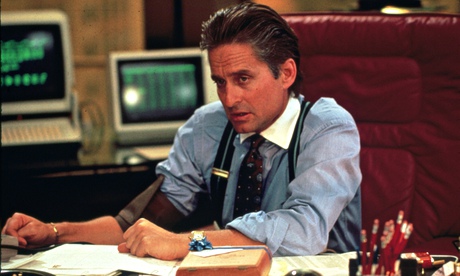
Michael Douglas as Gordon 'Greed is good' Gekko in Wall Street Photograph: SNAP/Rex Features
Wall Street (1987): beware the corporate raiders
Co-written and directed by Oliver Stone, and starring Michael Douglas, Wall Street documents the rise of modern "shareholder capitalism". From the 1930s to the 70s, "managerial capitalism" (ie capitalism managed by professional managers with little influence from shareholders), had prevailed in the advanced economies. However, by the 80s, floating shareholders driven by short-term financial gains started to get the upper hand.
Douglas plays Gordon "Greed is Good" Gekko, a ruthless corporate raider who wins the support of the shareholders managing a takeover bid for a company by pointing out the inefficiencies of corporate bureaucracy – the company has 33 vice-presidents, doing God knows what. Of course, his real intention is to asset-strip the company – sell off the valuable assets and close it down – rather than develop it.
The movie depicts a fundamental dilemma at the heart of modern capitalism. You cannot leave companies at the mercy of short-term-oriented financiers such as Gekko; but without pressure from shareholders, it is difficult to restrain inefficiency. In the quarter of a century since the film appeared, the balance has shifted too much in the direction of short-term shareholders, prompting criticisms of "quarterly capitalism". Under pressure from impatient shareholders, many companies, especially in the US and the UK, have become far too short-term-oriented and stopped investing in machines and technologies that only offer long-term returns. Ha-Joon Chang
Some Like It Hot (1959): the trouble with rentier capitalism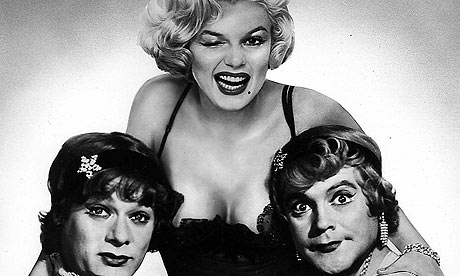
Some Like It Hot: Tony Curtis, Marilyn Monroe and Jack Lemmon expose rentier capitalism. Photograph: United Artists/EPASome Like It Hot is rightly acclaimed as a brilliant, quirky comedy. It has cross-dressing and shtick so rapid that even after 10 viewings you are still finding new things funny. But it is also a brilliant portrayal of what's wrong with rentier capitalism. Consider the world of the movie: Chicago, in which the main players are organised criminals and inept cops, and in which even talented musicians have to live on loans from their girlfriends and on the proceeds of gambling. Then Florida, in which elderly millionaires, before the Wall Street Crash, squander their money on leisure, yachts and chorus girls. In between there is the world of the train, which seems to have no workers aboard it, only the female band, where the hierarchical structures of mid-20th-century work and gender are lovingly replicated. Sweet Sue does not reprimand Sugar directly but has to get her underling, Beanstalk, to do it for her. The movie was made by people who remembered the Depression, so for all its crazy humour it is also a sombre lesson in the futility of boom-time societies in which the sources of income are gambling, speculation and casual sex work, but never actual work for wages and production. For me, the utter brilliance of the movie is only possible because it creates this unreal cosmos around speculation, crime and the brainless rich. Paul Mason
The Matrix (1999): you can't trust happiness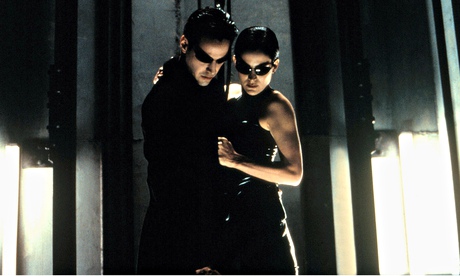
Keanu Reeves and Carrie-Anne Moss in The Matrix. But are they happy? Photograph: Allstar/Cinetext/WARNER BROSIt is increasingly accepted that income, the economists' traditional measure of human welfare, is not a good indicator of wellbeing. There are at least two reasons: first, because money is only one of the things we want in our lives; and second, because even when it comes to money, we often make poor decisions as consumers, influenced by advertising or driven by our desire to keep up with the Joneses.
As a result, some economists have tried to measure wellbeing by asking people directly how happy they are. But even ignoring the issue of whether happiness is something that can be measured, we can't really trust "happiness studies" because we cannot totally trust people's judgments on their own happiness.
First of all, there are all kinds of "adaptive preferences", in which people reinterpret bad situations to make them more bearable: "sour grapes" – deciding that what you could not get is actually not as good as you had thought – is a classic example. Moreover, many people who are oppressed, exploited or discriminated against, say that they are happy. Some even oppose changes that would improve their lot: many European women, for example, opposed the introduction of female suffrage in the early 20th century. These people think they are happy because they have come to accept – "internalise" is the fancy word here – the values of their oppressors. Marxists used to call it "false consciousness". The most perfected form of it is found in The Matrix, the Wachowskis' 1999 sci-fi movie in which people don't even know they are being used as organic batteries to power their machine overlords. HJC
Mary Poppins (1964): why banking is all about confidence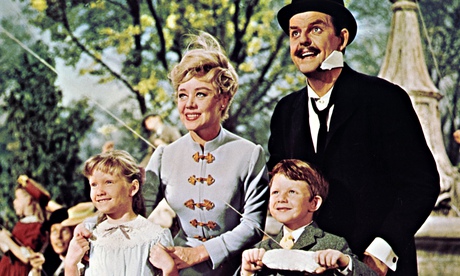
The Banks family in Mary Poppins. Young Michael accidentally starts a run on the family bank. Photograph: Disney/Sportsphoto Ltd./Allstar
Few people would associate this Disney movie, based on the books of the Australian-British writer PL Travers, with economics. But it contains a scene that gives an excellent summary of the nature of modern banking, one that opens with young Michael Banks visiting the Dawes, Tomes, Mousley, Grubbs Fidelity Fiduciary Bank, where his father works. Mr Dawes, the chairman (played by Dick van Dyke, who also plays Bert, the cockney jack-of-all-trades) tries to persuade the boy (with a song) to deposit his tuppence in the bank so that it can be invested in railways through Africa, dams across the Nile, and other fantastical investment projects.
Michael is not convinced and doesn't want to give up his coin; but mesmerised by the singing, he loses concentration and Mr Dawes is able to snatch it. "Give me back my money!" Michael shouts, prompting other customers to fear there is something wrong and demand their deposits back, creating a run on the bank – just as we saw at Northern Rock branches in 2007.
The scene illustrates how banks depend on maintaining the confidence of their depositors. Like all other banks, the Fidelity Fiduciary had made a promise it could not keep: it had promised its depositors that they would be paid in cash upon demand, when actually it had enough cash to pay only a proportion of them. This is usually not a problem. At any given time only a small proportion of depositors would want to withdraw their money, so it is safe for the bank to hold in cash only a fraction of the amount in its deposit accounts. But if a depositor begins to doubt the bank's ability to pay her back, she has the incentive to withdraw her money as soon as possible. Even if the doubts are totally unfounded (as in Mary Poppins), it will become a self-fulfilling prophecy if enough account holders think and act in this way.
This "confidence problem" has led to the development of central banks (such as the Bank of England), which can lend to banks in trouble, and of public deposit insurance: measures intended to give depositors more confidence in the banks, thus stabilising the banking system. Of course, the 2008 financial crisis has shown the limitations of these measures, because today deposit banking is overshadowed by other segments of the financial industry, such as investment banking, trading in derivatives and other "structured" financial products. HJC
Charlie and the Chocolate Factory (2005): the value of the welfare state
In the 2005 movie version of Roald Dahl's Charlie and the Chocolate Factory, Charlie's father loses his job as a toothpaste cap-screwer because someone has invented a machine that can do it much faster.
This kind of unemployment is known as "technological unemployment" and has been a constant feature of capitalism – just think about some of the professions that have all but disappeared except in name – chandler, weaver, miller, etc. Without constantly destroying old jobs and creating new jobs through technological innovations, capitalism cannot develop.
But the inevitability of technological unemployment does not mean that unemployed people should be left in the dustbin of history. Had Charlie's family lived in a country with a welfare state, which would provide unemployment benefit for the unemployed worker and income support for his family as well as subsidising his retraining, they would not have had to endure penury and that continuous diet of cabbage soup. HJC
Erin Brockovich (2000): how to measure environmental cost
Few people would associate this Disney movie, based on the books of the Australian-British writer PL Travers, with economics. But it contains a scene that gives an excellent summary of the nature of modern banking, one that opens with young Michael Banks visiting the Dawes, Tomes, Mousley, Grubbs Fidelity Fiduciary Bank, where his father works. Mr Dawes, the chairman (played by Dick van Dyke, who also plays Bert, the cockney jack-of-all-trades) tries to persuade the boy (with a song) to deposit his tuppence in the bank so that it can be invested in railways through Africa, dams across the Nile, and other fantastical investment projects.
Michael is not convinced and doesn't want to give up his coin; but mesmerised by the singing, he loses concentration and Mr Dawes is able to snatch it. "Give me back my money!" Michael shouts, prompting other customers to fear there is something wrong and demand their deposits back, creating a run on the bank – just as we saw at Northern Rock branches in 2007.
The scene illustrates how banks depend on maintaining the confidence of their depositors. Like all other banks, the Fidelity Fiduciary had made a promise it could not keep: it had promised its depositors that they would be paid in cash upon demand, when actually it had enough cash to pay only a proportion of them. This is usually not a problem. At any given time only a small proportion of depositors would want to withdraw their money, so it is safe for the bank to hold in cash only a fraction of the amount in its deposit accounts. But if a depositor begins to doubt the bank's ability to pay her back, she has the incentive to withdraw her money as soon as possible. Even if the doubts are totally unfounded (as in Mary Poppins), it will become a self-fulfilling prophecy if enough account holders think and act in this way.
This "confidence problem" has led to the development of central banks (such as the Bank of England), which can lend to banks in trouble, and of public deposit insurance: measures intended to give depositors more confidence in the banks, thus stabilising the banking system. Of course, the 2008 financial crisis has shown the limitations of these measures, because today deposit banking is overshadowed by other segments of the financial industry, such as investment banking, trading in derivatives and other "structured" financial products. HJC
Charlie and the Chocolate Factory (2005): the value of the welfare state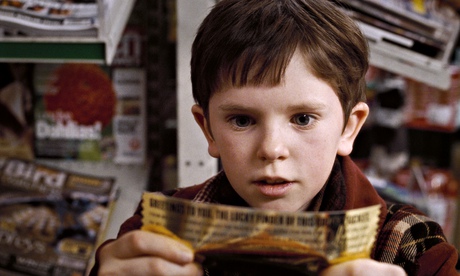
Freddie Highmore as Charlie Bucket in Charlie and the Chocolate Factory: what if his father had been able to claim unemployment benefit? Photograph: Ho/REUTERS
In the 2005 movie version of Roald Dahl's Charlie and the Chocolate Factory, Charlie's father loses his job as a toothpaste cap-screwer because someone has invented a machine that can do it much faster.
This kind of unemployment is known as "technological unemployment" and has been a constant feature of capitalism – just think about some of the professions that have all but disappeared except in name – chandler, weaver, miller, etc. Without constantly destroying old jobs and creating new jobs through technological innovations, capitalism cannot develop.
But the inevitability of technological unemployment does not mean that unemployed people should be left in the dustbin of history. Had Charlie's family lived in a country with a welfare state, which would provide unemployment benefit for the unemployed worker and income support for his family as well as subsidising his retraining, they would not have had to endure penury and that continuous diet of cabbage soup. HJC
Erin Brockovich (2000): how to measure environmental cost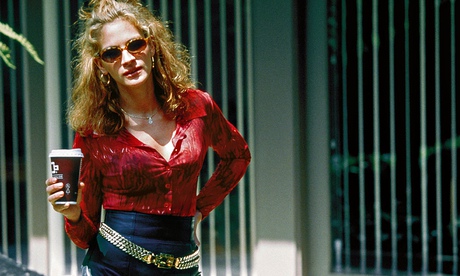
Julia Roberts explores environmental cost in Erin Brockovich. Photograph: Sportsphoto/Allstar/Cinetext Collection
Erin Brockovich, which was a hit in 2000, stars Julia Roberts, who won an Oscar for her role as an unemployed single mother of two who manages to get a job as a legal assistant in a California law firm. There, she stumbles on files about the unethical behaviour of a power company that was buying up land it had contaminated by the illegal dumping of hexavalent chromium. This was poisoning the water supply of residents and making them seriously ill. Albert Finney plays the hard-up boss of the law firm who agrees to take the case on. Against all odds they end up winning a class action lawsuit against Pacific Gas and Electric (PG&E) on behalf of their ill clients.
We all love conspiracy movies, but this was no Hollywood fiction. Erin exists, and indeed she won $333m from PG&E for her clients in 1996. And she has clearly not given up. Reportedly, she has just launched an attack on the pharmaceutical giant Bayer, which, she claims, is endangering the lives of thousands of women through its birth control drug Essure.
The film highlighted a real economic issue: the difficulty that markets have in putting a price on the impact of a company's core activity on the wider environment. In economics speak, this is the problem of measuring "externalities". Pollution, medical consequences, congestion, noise, climate change, community displacement and unrest fall into that category. What isn't measured tends to be ignored.
Some progress in this area has been made. In the decade that followed the film's release, companies have come under increased scrutiny for their business ethics. Corporate social responsibility has become something that companies espouse, at least publicly. A lot more needs to be done. But the business imperative is clear. Today, thanks to social media and 24/7 news, allegations of a company's failure to meet required standards travels instantly round the world. It can result in global boycotts of products, falls in share values, chief executives losing their jobs and, at times, companies that have been around for decades if not centuries going under. Think Enron, think Arthur Andersen – and many more. Vicky Pryce, whose latest book, Greekonomics, is published by Biteback Publishing
Erin Brockovich, which was a hit in 2000, stars Julia Roberts, who won an Oscar for her role as an unemployed single mother of two who manages to get a job as a legal assistant in a California law firm. There, she stumbles on files about the unethical behaviour of a power company that was buying up land it had contaminated by the illegal dumping of hexavalent chromium. This was poisoning the water supply of residents and making them seriously ill. Albert Finney plays the hard-up boss of the law firm who agrees to take the case on. Against all odds they end up winning a class action lawsuit against Pacific Gas and Electric (PG&E) on behalf of their ill clients.
We all love conspiracy movies, but this was no Hollywood fiction. Erin exists, and indeed she won $333m from PG&E for her clients in 1996. And she has clearly not given up. Reportedly, she has just launched an attack on the pharmaceutical giant Bayer, which, she claims, is endangering the lives of thousands of women through its birth control drug Essure.
The film highlighted a real economic issue: the difficulty that markets have in putting a price on the impact of a company's core activity on the wider environment. In economics speak, this is the problem of measuring "externalities". Pollution, medical consequences, congestion, noise, climate change, community displacement and unrest fall into that category. What isn't measured tends to be ignored.
Some progress in this area has been made. In the decade that followed the film's release, companies have come under increased scrutiny for their business ethics. Corporate social responsibility has become something that companies espouse, at least publicly. A lot more needs to be done. But the business imperative is clear. Today, thanks to social media and 24/7 news, allegations of a company's failure to meet required standards travels instantly round the world. It can result in global boycotts of products, falls in share values, chief executives losing their jobs and, at times, companies that have been around for decades if not centuries going under. Think Enron, think Arthur Andersen – and many more. Vicky Pryce, whose latest book, Greekonomics, is published by Biteback Publishing
The Sound of Music (1965): how to handle success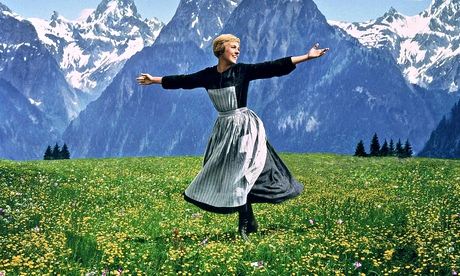
The Sound of Music: just because one musical is a hit, it doesn't follow that another one will be. Photograph: 20th Century Fox/Sportsphoto Ltd/Allstar
A musical about an errant trainee nun in the Austrian Alps, starring Julie Andrews, The Sound of Music was a gargantuan commercial success, rescuing 20th Century Fox from the $40m wounds inflicted two years earlier by Richard Burton and Elizabeth Taylor's Cleopatra. It remains, in inflation-adjusted dollars, the third-biggest-grossing film of all time.
Producer Richard Zanuck was 30 years old, and this was his first big hit. So what did he do next? Understandably, he tried to repeat what he'd just done."I was convinced that the musical was back, and a lot of people, a lot of other studio heads, were convinced that this was the way to go," he told me when we had lunch just days before he died in July 2012. He commissioned three more musicals, all in a similar sugary vein. All three were box-office flops.
First, Doctor Dolittle, an adaptation of the children's books by Hugh Lofting, contributed to 20th Century Fox posting a staggering $37m loss in 1967. The next, Star!, released in 1968, which starred Julie Andrews and had the same director, producer and choreographer as The Sound of Music, also bombed: box-office receipts in the US were just $4m, and losses were pegged at $15m. The third, Hello, Dolly!, released in 1969 and starring Barbra Streisand, did equally badly, losing $16m, bringing to a close a disastrous few years for the studio, and prompting Zanuck to lose his job as production chief.
It's not that the past is never a good predictor of what lies ahead. There are of course many examples we could cite of times when looking backwards, consciously or not, has helped people reach the right decisions. The key, though, is not to be wedded to our past successes and failures, or our experience-based instincts, so that shifting tides or new information are ignored. Nor should we assume a linear trajectory – more so now than ever, as we attempt to navigate today's uncertain and unpredictable digital world, in which things are changing with an ever greater rapidity.
Zanuck explained to me that his movie strategy immediately after The Sound of Music fell victim to a fast-changing world, and a shift in cultural mores. When The Sound of Music hit movie screens, the appeal of singing nuns and the lush Technicolor greenery of the Austrian hills made sense against the backdrop of the early 1960s. But by the time the back-to-back movie flops were released, things had moved on. The Vietnam war and the civil rights movement had politicised the American public, Martin Luther King had been assassinated, pop and rock music were dominant, and saccharine-sweet family productions had lost their appeal.
Success does not necessarily breed success. Just because we haven't seen a snake today or yesterday, it doesn't mean that we won't see one tomorrow. And just because a certain set of ingredients once worked, it doesn't mean they always will.
It is a testament to Zanuck's creative energy and willingness to introspect that he came back from these harsh experiences to produce Jaws, Driving Miss Daisy, Tim Burton's Alice in Wonderland and many other great movies. Noreena Hertz (Extracted from Eyes Wide Open: How to Make Smart Decisions in a Confusing World. Out in paperback on 17 July, priced £8.99)
A musical about an errant trainee nun in the Austrian Alps, starring Julie Andrews, The Sound of Music was a gargantuan commercial success, rescuing 20th Century Fox from the $40m wounds inflicted two years earlier by Richard Burton and Elizabeth Taylor's Cleopatra. It remains, in inflation-adjusted dollars, the third-biggest-grossing film of all time.
Producer Richard Zanuck was 30 years old, and this was his first big hit. So what did he do next? Understandably, he tried to repeat what he'd just done."I was convinced that the musical was back, and a lot of people, a lot of other studio heads, were convinced that this was the way to go," he told me when we had lunch just days before he died in July 2012. He commissioned three more musicals, all in a similar sugary vein. All three were box-office flops.
First, Doctor Dolittle, an adaptation of the children's books by Hugh Lofting, contributed to 20th Century Fox posting a staggering $37m loss in 1967. The next, Star!, released in 1968, which starred Julie Andrews and had the same director, producer and choreographer as The Sound of Music, also bombed: box-office receipts in the US were just $4m, and losses were pegged at $15m. The third, Hello, Dolly!, released in 1969 and starring Barbra Streisand, did equally badly, losing $16m, bringing to a close a disastrous few years for the studio, and prompting Zanuck to lose his job as production chief.
It's not that the past is never a good predictor of what lies ahead. There are of course many examples we could cite of times when looking backwards, consciously or not, has helped people reach the right decisions. The key, though, is not to be wedded to our past successes and failures, or our experience-based instincts, so that shifting tides or new information are ignored. Nor should we assume a linear trajectory – more so now than ever, as we attempt to navigate today's uncertain and unpredictable digital world, in which things are changing with an ever greater rapidity.
Zanuck explained to me that his movie strategy immediately after The Sound of Music fell victim to a fast-changing world, and a shift in cultural mores. When The Sound of Music hit movie screens, the appeal of singing nuns and the lush Technicolor greenery of the Austrian hills made sense against the backdrop of the early 1960s. But by the time the back-to-back movie flops were released, things had moved on. The Vietnam war and the civil rights movement had politicised the American public, Martin Luther King had been assassinated, pop and rock music were dominant, and saccharine-sweet family productions had lost their appeal.
Success does not necessarily breed success. Just because we haven't seen a snake today or yesterday, it doesn't mean that we won't see one tomorrow. And just because a certain set of ingredients once worked, it doesn't mean they always will.
It is a testament to Zanuck's creative energy and willingness to introspect that he came back from these harsh experiences to produce Jaws, Driving Miss Daisy, Tim Burton's Alice in Wonderland and many other great movies. Noreena Hertz (Extracted from Eyes Wide Open: How to Make Smart Decisions in a Confusing World. Out in paperback on 17 July, priced £8.99)
The Full Monty (1997): the reality of unemployment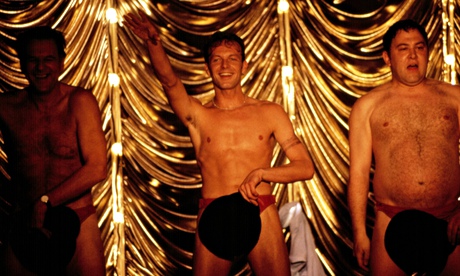
The Full Monty, in which unemployed stel workers turn to stripping, rather than inevstment banking, to bay the bills. Photograph: c.20thC.Fox/Everett/REX
This hit British movie, starring Robert Carlyle and Tom Wilkinson, is mainly remembered for its exuberant male stripping act. However, the road the six protagonists travel to reach that final scene is a troubled one.
In Sheffield in the mid-90s, industrial decline, particularly in the steel industry, had led to widespread unemployment. In the film, six jobless workers form a stripping troupe, after a long period of frustration, indignity, and deprivation.
In standard economic theory, this kind of unemployment should not exist. If the British steel industry goes into decline because of competition from, say, South Korea, the industry will shrink and release the capital (machines) and the labour (workers) that it used to employ. The capital and labour thus released will be absorbed by industries in which Britain is relatively more efficient, but, then, how many former steel workers do you know who have been re-employed by Goldman Sachs as an investment banker?
The point is that workers cannot freely move across different jobs, because their experience is specific to their line of work – there are few skills that are equally valuable in all industries. The alternative that most unemployed workers face is to get a new job that does not require much skill – in this case, stripping – that pays far less. HJC.
This hit British movie, starring Robert Carlyle and Tom Wilkinson, is mainly remembered for its exuberant male stripping act. However, the road the six protagonists travel to reach that final scene is a troubled one.
In Sheffield in the mid-90s, industrial decline, particularly in the steel industry, had led to widespread unemployment. In the film, six jobless workers form a stripping troupe, after a long period of frustration, indignity, and deprivation.
In standard economic theory, this kind of unemployment should not exist. If the British steel industry goes into decline because of competition from, say, South Korea, the industry will shrink and release the capital (machines) and the labour (workers) that it used to employ. The capital and labour thus released will be absorbed by industries in which Britain is relatively more efficient, but, then, how many former steel workers do you know who have been re-employed by Goldman Sachs as an investment banker?
The point is that workers cannot freely move across different jobs, because their experience is specific to their line of work – there are few skills that are equally valuable in all industries. The alternative that most unemployed workers face is to get a new job that does not require much skill – in this case, stripping – that pays far less. HJC.